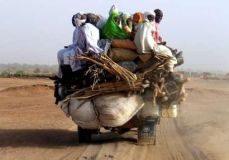New IDPs seek refuge in Gereida, South Darfur
Dec 1, 2005 (NAIROBI) — Some 5,000 people have sought refuge in Gereida town over the past week, following violent clashes in the conflict-torn western Sudanese state of South Darfur that had already displaced 15,000, the international NGO Oxfam reported.
 “We are now estimating that between 18,000 and 20,000 IDPs [internally displaced persons] have newly arrived in Gereida, although the number hasn’t been officially confirmed yet,” said Nicki Bennett, spokeswoman for Oxfam in Sudan, on Wednesday.
“We are now estimating that between 18,000 and 20,000 IDPs [internally displaced persons] have newly arrived in Gereida, although the number hasn’t been officially confirmed yet,” said Nicki Bennett, spokeswoman for Oxfam in Sudan, on Wednesday.
“We are still seeing the regular arrival of households who fled their villages every day,” she added. “Everything we are hearing indicates that more people will arrive over the next few days.”
Although the initial influx of IDPs was mainly from the Massalit ethnic group, the most recent arrivals were predominantly from the Falata community. An estimated 1,000 Falata households had now arrived in Gereida, Bennett noted.
The displacement followed fighting at the beginning of November that affected 26 villages. While most of the violence occurred between members of the Massalit and the Falata, the fighting in the Gereida area involved a volatile mix of various armed groups, including the rebel Justice and Equality Movement (JEM), the Sudan Liberation Movement/Army (SLM/A) and government armed forces, a local source reported.
A UN assessment mission to Gereida on 19 November established that the fighting had subsided in the area west of Gereida since 17 November.
The situation remained tense, however, as armed Massalit had returned to their villages to defend their harvest against possible attacks from the Falata.
“The tensions are [also] affecting people’s lives in Gereida in a major way,” Bennett observed. Some shops were closed, children were not going to school, and some people were even afraid to go the hospital, she said.
The African Union (AU) listed about 26 villages around Gereida that had been looted and allegedly burned to the ground during the attacks and confirmed that hundreds of people were killed and many were missing.
“Our team is very worried about the large numbers of animals that arrived in Gereida,” Bennett warned, explaining that the animals pose a serious public health risk as well as put a strain on local water resources.
Oxfam had sent seven engineers to Gereida to increase water production from 285,000 to 1 million litres a day, she added.
As sanitation was becoming a big problem as well, at least 1,500 new family latrines and bathing cubicles were under construction. Extra cattle troughs would also be necessary to accommodate the large numbers of animals that people had brought.
The International Committee of the Red Cross was providing food and nonfood items and had scaled up the capacity of its existing medical clinics.
Although the initial 15,000 newly arrived IDPs were accommodated in a new camp for displaced people – the town’s third – Bennett expected that another camp was needed to house the Falata households, which had to be separated from the existing, largely Massalit, population.
The number of IDPs who have sought refuge in Gereida is now approximately 60,000 – three times the resident population, the ICRC reported.
A joint Massalit and Falata reconciliation committee had been established by Sheikh Musa, a religious leader in Nyala, in an attempt to calm the situation, the local observer added.
The Darfur conflict erupted in February 2003 when the SLM/A and the JEM, took up arms to fight what they called the discrimination and oppression of the region by the Sudanese government. The government is accused of unleashing militia – known as the Janjawid – on civilians in an attempt to quash the rebellion.
According to the UN, some 3.4 million people continue to be affected by the conflict, of whom 1.75 million are internally displaced and 200,000 have fled to neighbouring Chad.
(IRIN)
